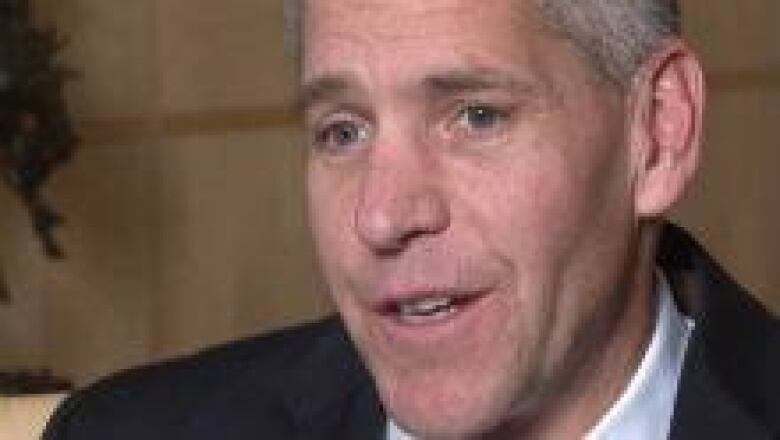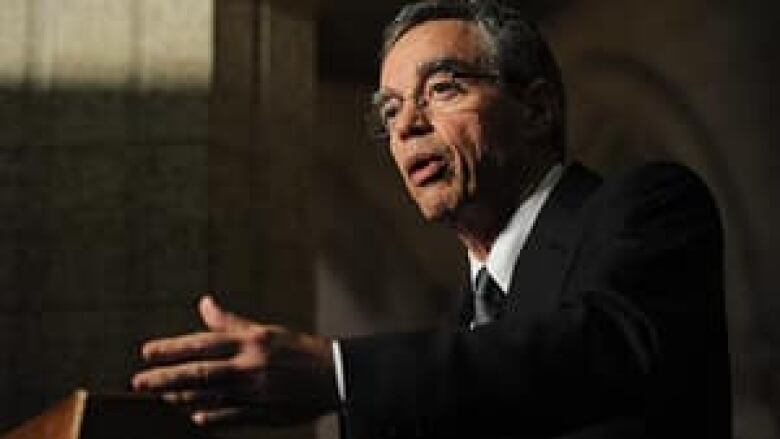Energy East pipeline may create 10,000 jobs, study says
TransCanada Corp. hired Deloitte to conduct economic analysis of proposed pipeline
TransCanada Corp.'s proposed west-east pipeline could create 10,000 jobs and generate $10 billion in additional GDP during the development and constructionphase, according to an economic analysis released on Tuesday.
The project could generate anadditional $25.3 billion in GDP during its estimated 40 years ofoperation and sustain1,000 direct full-time jobs, the independent report prepared by Deloitte & Touchefound.
Energy East could also generate $10 billion in tax revenues for all levels of government over the life of the project, which is expected to extend beyond 40 years with regular maintenance, Deloitte projected.

"Energy East is a critical infrastructure project for all Canadians because it will enhance our country's energy security, allow us to receive greater value for our important natural resources and will create tangible economic benefits for communities across the country," TransCanada's president and chief executive officer Russ Girling said in a statement.
The Calgary-based company released the report it commissioned on itsproposed $12-billion Energy East Pipeline project on Tuesday morning.
All six provinces along thepipeline's proposed route are projected to see job creation, economic growth and increased tax revenues.
The Deloitte report shows 2,300 direct full-time equivalentjobs will be created during the three-year development period and 7,700 during the three-year construction phase.
That combined six-year periodcould add $10 billion in GDP across the country, Deloitte found, based on Statistics Canada's input/output model, which measures direct, indirect and induced economic effects of large industrial projects and activities in Canada.
Alternatives to Keystone, Oliver says

Federal Natural Resources Minister Joe Oliver says the TransCanada Energy East projects shows Canada has real alternatives to getting its oil to market, other than the much-delayed Keystone pipeline project.
"That is one of the issues being discussed in relation to the Keystone project. They were saying if Keystone's not built, well the production won't increase. Well, the fact is there are alternatives and moving the oil to the east is one of them. And a big one," Oliver said.
The Energy East pipeline project, which still needs regulatory approval, would send 1.1 million barrels of oil per day from Western Canada to refineries and export terminals in Eastern Canada.
Oliver said it will be up to the National Energy board to determine if TransCanada's claims about jobs and benefits are accurate and that his government won't get involved in endorsing the specific project until after that occurs.
He did, however, say he's excited by the idea.
"I'm excited about the prospect of moving Canadian crude to Eastern Canada. I'm excited about the prospect of jobs and energy security," he said.
'Clear advantages'
"We have this rather curious situation where we have been importing oil, often from tankers up the St. Lawrence from the North Sea and north Africa when we have this vast amount of oil reserves in Western Canada.
"Here's an opportunity to move resources in Canada to supply lower cost Canadian crude to the East."
The minister says it's critical Canada find new markets for its oil as the U.S. is going to need less oil and gas from the country, Oliver said.
"I think there are clear advantages in terms of moving Canadian crude to refineries in the East and then ship some of it to foreign markets, which is part of our critical diversification program because otherwise we will end up with resources stranded and our legacy lost," he said.
"So there's jobs, there's economic activity and significant revenue to governments to support critical social programs."
TransCanadaannounced in August it would move forward with the project and it has been holding meetings in New Brunswick to discuss the pipeline with citizens in communities that could be affected.
The companyhas estimated the project will cost $12 billion, excluding the transfer value of Canadian Mainline natural gas assets.
TransCanadais proposing to convert roughly 3,000 kilometres of natural gas pipeline on its existing Canadian Mainline route so it can carry crude oil.
Itwould also construct 1,400 kilometres of new pipeline to carry crude oil into Saint John, where it will end at the Canaport LNG terminal.
NewBrunswick impact
The economic analysis suggested the pipeline project would create 332 direct jobs during the three-year development phase and 1,095 direct jobs in the three-year construction phase in New Brunswick
When the consultant looked at indirect jobs and induced jobs, those numbers grew to 868 and 2,866 jobs for the province.
The pipeline would mean 121 direct jobs during the 40-year operations phase, Deloitte found.
The project would also generate $266 million in tax revenues during the development and construction phases and $428 million during the operations phase.
The GDP impact for New Brunswick would be $1.1 billion in the development and construction period and $1.6 billion during the 40-year operations phase.
"The study, obviously, breaks out the benefits to New Brunswick and it is a very significant benefit given that a lot of the new construction is going through the province of New Brunswick," said TransCanadas Alexander Pourbaix, the president of energy and oil pipelines.
Projections questioned

New Brunswick Green Party Leader David Coon is not convinced about the accuracy of the study's economic analysis.
Coon pointed to another energy infrastructure project that was supposed to generate a lot of workfor New Brunswick but the reality fell short of the initial expectations.
"People will see 1,000 such jobs for construction of the pipeline over a number of years and they will remember the national gas pipeline and the crews that came from outside New Brunswick and the kinds of jobs New Brunswickers got," he said.
"There weresome, but most of the technical work was done by outside crews."
Even if New Brunswick gets the estimated 121 full-time jobs during operations, that's far less than other provinces, such as Ontario and Quebec, said Coon.
"To put it in perspective, that's about the number of jobs that would be created in the plywood mill in Miramichi if the government would allow it to open by giving it some Crown wood," he said.
'We're not talking about something that's going to have a gigantic impact on employment over the long-term in our province.' Green Party Leader David Coon
"So we're not talking about something that's going to have a gigantic impact on employment over the long-term in our province."
Deloittesays approximately half of the jobs created in the development and construction phase will be in the construction, engineering, architectural, and oiland gas support services industries, while approximately half of the jobs in the operations phase will be in the oil and natural gas pipelines and power generation and transmission industries.
There will also be thousands of indirect and induced jobs in all provinces along the route, the analysis found.
Bob Schultz, a business professor at the University of Calgary, believes the job and revenue predictions look accurate.
But for New Brunswick, he says, the pipeline is more about getting oil to the Irving Oil refinery in Saint John.
"This will ensure a secure, politically-stable supply to the eastern refineries, as [opposed to] the risky off-shore supply," Schultz said.
The Irving Oil Ltd. refinery is the largest in Canada and can process 300,000 barrels of oil per day. Saint John also has a deep-water port and a liquefied natural gas facility.
Route concerns
"I think the next question is going to be on the environment, not on the jobs,"Schultz said.
Coon contends the environment should trump what he believes will be short-term jobs.
Giving Alberta a reason to expand its tar sands, and a reason for New Brunswick to continue to rely on fossil fuel, is a poor path to take, he said.
"We can't invest in new fossil fuel infrastructure. Its going to lock us into increasing greenhouse gas emissions for the next 40 years. It's just not responsible."
Some municipalities, such as Edmundston, have already raised concerns about the proposed route of the project.
Pourbaix said the pipeline company is busy working with community groups to help address any concerns.
"We dont come up with this route by ourselves, we come up with it in a combination of the work we do, but listening very closely to stakeholders along the route," he said.
"We are aware of those comments. We are engaging with stakeholders in that part of the province."
TransCanada has three more public meetings scheduled for this week.A meeting inHampton on Tuesday attracted about 150 people within the first hour, saysCBC reporter Connell Smith.
Officials are slated to beinChipman on Wednesday and Stanley on Thursday.













_(720p).jpg)


 OFFICIAL HD MUSIC VIDEO.jpg)
.jpg)



























































































